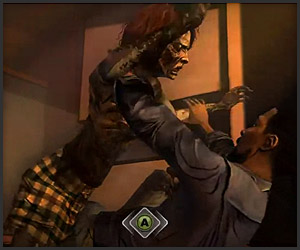 |
| If you see this, you are in sore need of guns |
"The Walking Dead" is a brillant series in its own right. It does everything right what you can do right about a zombie story, mainly not making the story about zombies and humans running mindlessly before them, but to examine the deeper layers of humanity that are tested by an extraordinary event such as a zombie outbreak. Now, knowing the average zombie video game, and knowing the average video game adaption of popular movies and series, one could expect an uninspired shooter, a bad version of "Left 4 Dead" with some name-throwing for good measure. The quick dollar, as done so often. But "The Walking Dead", which is available on Steam, promises something else: in five episodes, released in the weeks and months to come, it wants to tell a developing story affected by the player's choices. The focus is promised to lay on the characters, not on the gore and violence.
There is much to be said for this approach, but one is sceptical. After all, no game has yet managed to get the "your decisions affect the game" thingy right. Most of the time, it's just trying to optimize the benefits that certain decisions will bring you, which ruins the point of all those moral systems that are thrown onto games these days. It's not really a morality issue anymore when one choice throws new abilities at the player character while the other does simply nothing of the sort, and the only "consequences" these choices have are slightly altered dialogue lines. So, my hopes weren't exactly high, and seeing the graphics for the first time I felt like I was beta-testing "Borderlands", but without the guns.
 |
| Nothing like a smart-pants little girl in a zombie apocalypse |
When the dead rises like expected, we have to hit his head to get him from biting us and trembling insert a bullet in his gun. When we finally kill him, panting over the physical and emotional effort, we know for sure that this game isn't like your normal game. This one will be different, no doubt about it. I don't want to spoil anymore of the story, so I'm talking about the choice system in broader terms. It is true that the games forces you to make decisions. There are basically two of them: dialogue choices, and rescue choices. The dialogue choices are more common. You have to decide, under pressure of time, what you want to answer, and the hook about it is that the characters are remembering your answers and will come back at them, especially if your story proves to be inconsistent. This is remarkable in its own right. But you also have to make many moral choices. Will you tell a child the hard truth that his parents are most likely dead, or are you trying to create an ever threatened fantasy world to shield them from the horrors? The story and the characters will develop differently, depending on your choices.
 |
| The usual gameplay. Notice: no guns. |
When it comes to rescue decisions, the game is more straight-forward. Will you rescue the male or the female? The child or the adult? You can rescue only one. And this character will then stick around, and others will react to your choice. In Episode 3, one character was still wroth with me for a choice I made in Episode 1. And be sure that these are no easy choices. When there are well written characters around, it is very hard to choose whom of those is to live and who to die. At the end of each episode, you get a table of how you decided and how the other players decided, so you can compare if you're in the average level.
This only works because the game understands the most important thing about a choice system: it's not to be used as a disguise to allocate some skill points, but as a measure of driving the narrative. Your choices do not affect the gameplay in any way. You don't get more or better gear, the game does not get easier or harder. It's the story that develops. And the story is the most important thing about the game. It is something you almost never see, and that alone is worth playing it. You should certainly not play it just to play a nice zombie games, because the gameplay itself kind of sucks. The controls are icky, the difficulty level almost non-existent. When I died, I did so because I didn't get how the controls worked in the specific situation, not because it was hard. This may read as an urgent recommendation not to buy it, but it doesn't matter. This is not about gameplay, it's more an interactive movie. And a damn good one, too. Take it, and play it. You will be all the more richer for it, I promise.
 |
| Press "A" to avoid being eaten. |
No comments:
Post a Comment